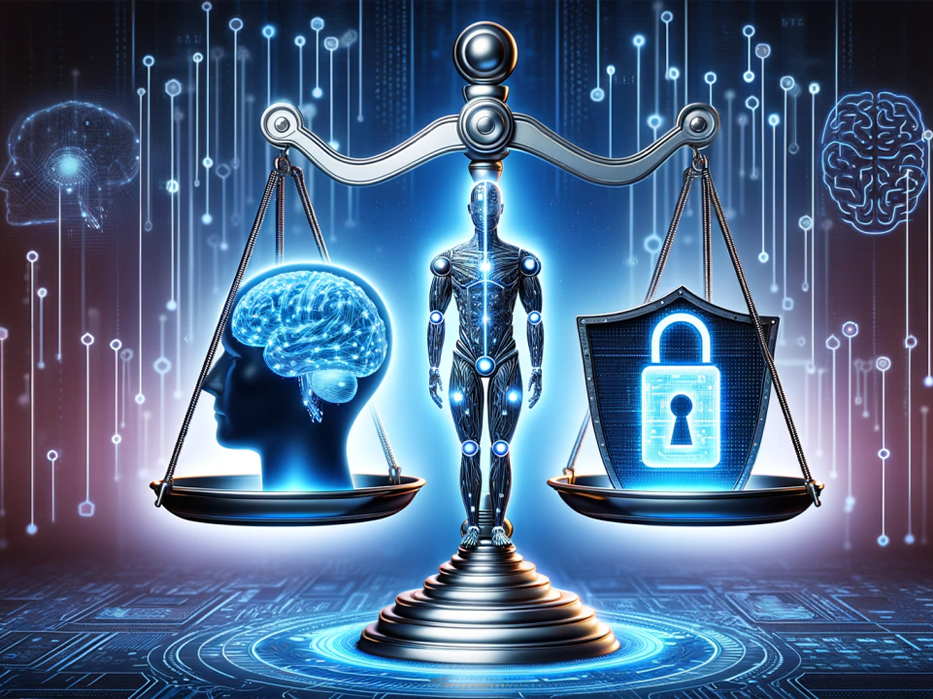Artificial Intelligence (AI) has emerged as a transformative force in modern society, revolutionizing industries and reshaping the way we live, work, and interact. From autonomous vehicles to personalized healthcare, AI-driven innovations hold the promise of solving some of the most pressing challenges of our time. However, alongside these remarkable advancements, there lies a growing concern about the ethical implications of AI. As we venture further into the age of AI, the need to balance innovation with ethical responsibility has never been more critical.
The Dual Nature of AI: Potential and Peril
AI’s potential is vast, offering opportunities to enhance efficiency, productivity, and even creativity across various sectors. In healthcare, AI can assist in diagnosing diseases with unprecedented accuracy, while in finance, it can optimize investment strategies and detect fraudulent activities in real time. However, AI also has the capacity to cause harm if not developed and deployed responsibly. The dual nature of AI—its potential to both benefit and harm—highlights the importance of ethical considerations in its development.
The Importance of Ethical AI
Ethical AI refers to the design, development, and deployment of AI systems in ways that align with human values and ethical principles. It encompasses a broad range of considerations, including fairness, transparency, accountability, and respect for human rights. The importance of ethical AI extends beyond technical aspects; it is about ensuring that AI serves the common good and enhances, rather than diminishes, human dignity.
1. Human-Centric AI: At its core, ethical AI prioritizes the well-being of individuals and communities. This human-centric approach requires that AI systems are designed to be inclusive, respecting diversity and promoting equality. It also involves protecting the autonomy of individuals by ensuring that AI does not infringe on their rights or freedoms.
2. Building Trust in AI: Trust is a fundamental component of ethical AI. For AI systems to be widely accepted and integrated into society, they must be trustworthy. This means that users need to understand how AI systems work, feel confident that they are safe and reliable, and believe that these systems operate in a fair and just manner.
Key Ethical Challenges in AI Development
As AI continues to evolve, several ethical challenges have come to the forefront. Addressing these challenges is essential to ensuring that AI technologies are developed and used responsibly.
1. Bias and Discrimination:
- Algorithmic Bias: AI systems learn from data, and if the data they are trained on reflects societal biases, these biases can be perpetuated or even amplified by the AI. For example, an AI used in hiring might favor certain demographic groups over others if the training data includes historical hiring biases. Such biases can lead to unfair outcomes, reinforcing existing social inequalities.
- Impact on Marginalized Communities: AI systems can disproportionately impact marginalized communities, who may already face systemic discrimination. For instance, predictive policing algorithms, which are designed to forecast where crimes might occur, have been criticized for targeting minority communities more heavily, leading to over-policing and potential civil rights violations.
2. Privacy and Surveillance:
- Data Privacy: AI systems often rely on vast amounts of data, including personal information, to function effectively. This raises significant privacy concerns, particularly when it comes to how data is collected, stored, and used. There is a growing need for robust data protection measures to ensure that individuals’ privacy rights are upheld.
- Surveillance and Autonomy: The use of AI in surveillance, whether by governments or private companies, presents ethical dilemmas. While surveillance can enhance security, it also poses risks to individual autonomy and freedom. The widespread use of facial recognition technology, for example, has sparked debates about its potential to enable mass surveillance and erode privacy.
3. Transparency and Accountability:
- The Black Box Problem: One of the most significant challenges in AI ethics is the lack of transparency in AI decision-making processes. Many AI systems operate as “black boxes,” where the rationale behind a decision is not easily understood, even by their creators. This opacity can lead to a lack of accountability, making it difficult to address errors or biases.
- Ensuring Accountability: As AI systems take on more critical roles in society, ensuring accountability becomes paramount. Who is responsible when an AI system makes a mistake? How can we ensure that AI systems are held to ethical standards? These are questions that need to be addressed to build a framework of accountability in AI development.
4. Autonomy and Human Rights:
- Impact on Employment: The rise of AI has led to concerns about job displacement, as automation and AI systems take over tasks traditionally performed by humans. While AI can create new job opportunities, there is a need to manage the transition in a way that respects workers’ rights and ensures that economic benefits are broadly shared.
- Human Rights and AI: AI technologies must be developed with a strong commitment to human rights. This includes ensuring that AI does not enable or exacerbate violations of rights, such as discrimination, unlawful surveillance, or restrictions on freedom of expression.
Frameworks and Guidelines for Ethical AI
To navigate the ethical challenges of AI, various frameworks and guidelines have been developed by organizations, governments, and international bodies. These frameworks provide principles and best practices for ethical AI development and deployment.
1. Principles of Ethical AI:
- Fairness: AI systems should be designed to treat all individuals and groups fairly. This means actively working to eliminate biases in AI algorithms and ensuring that AI does not reinforce existing inequalities.
- Accountability: Developers and organizations must be accountable for the AI systems they create. This includes being transparent about how AI systems work and taking responsibility for their outcomes.
- Transparency: AI systems should be transparent and explainable, allowing users and stakeholders to understand how decisions are made. This transparency is key to building trust and ensuring that AI systems can be held accountable.
- Privacy and Security: AI systems must respect individuals’ privacy and ensure the security of personal data. This involves implementing strong data protection measures and being transparent about data collection and usage practices.
- Human-Centric Design: AI should be designed with a focus on human needs and values. This includes ensuring that AI enhances human capabilities and well-being, rather than undermining them.
2. Regulatory Approaches:
- European Union’s AI Act: The European Union has proposed the AI Act, a comprehensive regulatory framework aimed at ensuring that AI is developed and used in a way that respects fundamental rights. The AI Act classifies AI systems into different risk categories, with stricter regulations for high-risk applications, such as those used in law enforcement, healthcare, and employment.
- Global Initiatives: Various international organizations, including the United Nations and the OECD, have developed guidelines and principles for ethical AI. These initiatives aim to foster global cooperation and ensure that AI development aligns with shared human values.
3. Industry Standards and Best Practices:
- Corporate Responsibility: Many tech companies have recognized the importance of ethical AI and have developed internal guidelines and practices to ensure responsible AI development. This includes creating ethics committees, conducting regular audits of AI systems, and engaging with external stakeholders.
- Collaborative Efforts: Collaboration between different stakeholders—governments, companies, academia, and civil society—is crucial for advancing ethical AI. By working together, these groups can share knowledge, develop best practices, and create a more comprehensive approach to AI ethics.
The Role of Stakeholders in Promoting Ethical AI
Ensuring that AI is developed and deployed ethically is not the responsibility of any single group. It requires the active involvement of multiple stakeholders, each with a critical role to play.
1. Developers and Engineers:
- Ethical Design: Developers and engineers are at the forefront of AI innovation. They must integrate ethical considerations into the design and development processes, ensuring that AI systems are fair, transparent, and accountable from the outset.
- Continuous Learning: The field of AI is rapidly evolving, and developers must stay informed about emerging ethical challenges. Continuous learning and ethical awareness are essential for building responsible AI systems.
2. Policymakers and Regulators:
- Creating Ethical Frameworks: Policymakers and regulators have the responsibility to create and enforce frameworks that ensure AI is used in ways that align with societal values. This includes developing regulations that address ethical concerns and setting standards for AI development and deployment.
- Balancing Innovation and Regulation: While regulation is essential, it must be balanced with the need for innovation. Policymakers should aim to create a regulatory environment that encourages ethical AI development without stifling creativity and progress.
3. Businesses and Organizations:
- Corporate Ethics: Businesses that develop or deploy AI systems must adopt ethical practices that go beyond compliance with regulations. This includes engaging with stakeholders, conducting ethical impact assessments, and fostering a culture of responsibility.
- Transparency with Consumers: Businesses should be transparent with consumers about how AI systems are used and how decisions are made. This transparency is key to building trust and ensuring that AI benefits are shared equitably.
4. Academia and Research Institutions:
- Advancing Ethical Research: Academic institutions play a vital role in advancing research on AI ethics. This includes exploring the societal impacts of AI, developing new ethical frameworks, and educating the next generation of AI practitioners on the importance of ethical considerations.
- Interdisciplinary Collaboration: The complex ethical challenges of AI require insights from multiple disciplines, including computer science, ethics, law, and social sciences. Interdisciplinary collaboration is essential for addressing these challenges comprehensively.
5. Civ il Society and the Public:
- Public Engagement: The public has a significant role to play in shaping the future of AI. Public engagement and awareness are essential for ensuring that AI technologies reflect societal
Conclusion
As AI continues to evolve, the challenge of balancing innovation with ethical responsibility will only grow more complex. By adopting a proactive approach to ethical AI, we can harness the full potential of AI technologies while safeguarding the values that are essential to a just and equitable society. The key lies in recognizing that ethical considerations are not obstacles to innovation but rather integral components of responsible and sustainable AI development.





